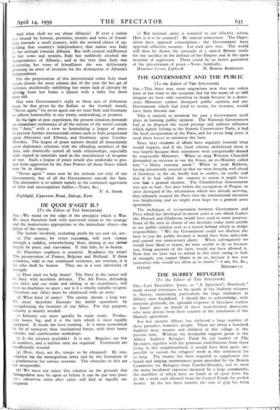THE GOVERNMENT AND THE PUBLIC
[To the Editor of THE SPECTATOR]
SIR,—This letter may seem ungracious now that our rulers have at last risen to the occasion, but far too many of us still imagine we have only ourselves to thank because in a demo- cracy Ministers cannot disregard public opinion, and any Government which had tried to rearm, for instance, would have been thrown out.
This is entirely to overlook the part a Government itself plays in forming public opinion. The National Government had at its disposal the social prestige and indirect influence which rightly belong to the historic Conservative Party, it had the local co-operation of the Press, and for seven long years it used these forces to minimise the facts.
Since 1933 students of affairs have regularly foretold what would happen, and if the loyal citizens disbelieved them it was largely-because their statements were categorically denied by responsible Ministers. When in 1934 Winston Churchill demanded an increase in our Air Force, an ex-Minister called him " a Malay running amok." When in 1936 Baldwin, having persistently assured us that we were keeping well ahead of Germany in the air, finally had to confess, he coolly said that if he had asked the country to rearm it might have cost hie a general election. The Chamberlain Government was just as bad : five days before the occupation of Prague, in utter disregard of the information which was already arriving, they solemnly assured the Press that the international situation was brightening and we might even hope for a general arms agreement.
The technique of co-operation between Government and Press which has developed in recent years is one which leaders like Disraeli and Gladstone would have used to some purpose. Some of the men in charge of our destinies today seem unable to use public opinion save as a screen behind which to dodge responsibility : " We the Government could not disclose the facts to you the public because it would have been indiscreet and caused you unnecessary alarm. When subsequently we would have liked to rearm, we were unable to do so because you, being unaware of the facts, would not have allowed it. Now that we have had to retreat in this crisis owing to lack of strength, you cannot blame it on us, because it was you yourselves who would not allow us to rearm."—I am, Sir, &c.,






































 Previous page
Previous page